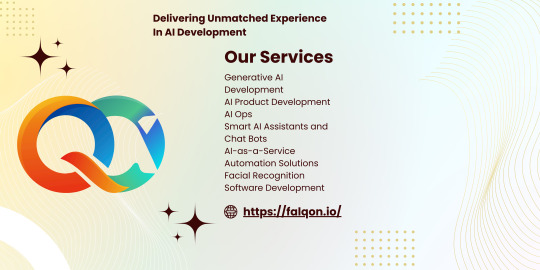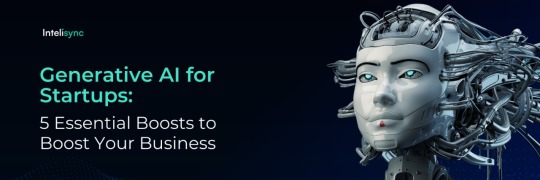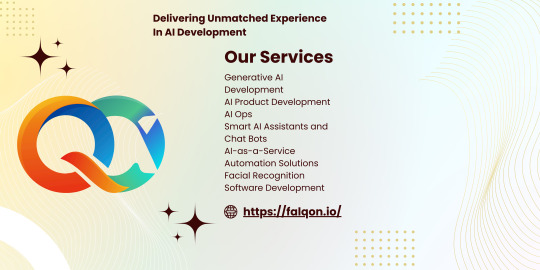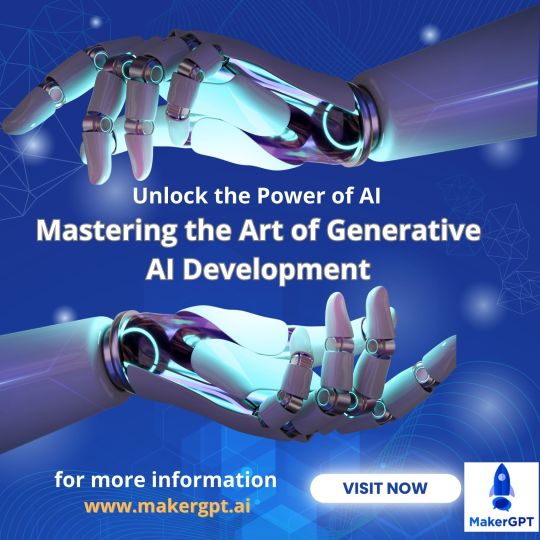#Custom AI Model Development
Explore tagged Tumblr posts
Text
#best sourcing specialists in india#manufacturing support#custom ai model development#ai-driven hardware development#ui ux principles
0 notes
Text

Our Generative AI team specializes in Custom AI Model Development and is really good at making unique AI models for Text Generation, Computer Vision, Generative Adversarial Networks, Transformer-based models, Audio generation etc using Team of Keys. For more details, Visit now!
0 notes
Text
Custom AI Model Development With Delimp Technology
Our Generative AI team specializes in Custom AI Model Development and is really good at making unique AI models for Text Generation, Computer Vision, Generative Adversarial Networks, Transformer-based models, Audio generation etc using Team of Keys. For more details, Visit now!
0 notes
Text
Book custom AI model development service Need help to develop an AI model for your business? Book our custom AI model development service to get quality solutions for your business. Our developers can develop the model with required specifications and accuracy. Call us to book our developers now.
0 notes
Text

artificial intelligence| ai development companies| ai in business| ai for business automation| ai development| artificial intelligence ai| ai technology| ai companies| ai developers| ai intelligence| generative ai| ai software development| top ai companies| ai ops| ai software companies| companies that work on ai| artificial intelligence service providers in india| artificial intelligence companies| customer service ai| ai model| leading ai companies| ai in customer support| ai solutions for small business| ai for business book| basic knowledge for artificial intelligence| matching in artificial intelligence|
#artificial intelligence#ai development companies#ai in business#ai for business automation#ai development#artificial intelligence ai#ai technology#ai companies#ai developers#ai intelligence#generative ai#ai software development#top ai companies#ai ops#ai software companies#companies that work on ai#artificial intelligence service providers in india#artificial intelligence companies#customer service ai#ai model#leading ai companies#ai in customer support#ai solutions for small business#ai for business book#basic knowledge for artificial intelligence#matching in artificial intelligence
2 notes
·
View notes
Text
Think Smarter, Not Harder: Meet RAG

How do RAG make machines think like you?
Imagine a world where your AI assistant doesn't only talk like a human but understands your needs, explores the latest data, and gives you answers you can trust—every single time. Sounds like science fiction? It's not.
We're at the tipping point of an AI revolution, where large language models (LLMs) like OpenAI's GPT are rewriting the rules of engagement in everything from customer service to creative writing. here's the catch: all that eloquence means nothing if it can't deliver the goods—if the answers aren't just smooth, spot-on, accurate, and deeply relevant to your reality.
The question is: Are today's AI models genuinely equipped to keep up with the complexities of real-world applications, where context, precision, and truth aren't just desirable but essential? The answer lies in pushing the boundaries further—with Retrieval-Augmented Generation (RAG).
While LLMs generate human-sounding copies, they often fail to deliver reliable answers based on real facts. How do we ensure that an AI-powered assistant doesn't confidently deliver outdated or incorrect information? How do we strike a balance between fluency and factuality? The answer is in a brand new powerful approach: Retrieval-Augmented Generation (RAG).
What is Retrieval-Augmented Generation (RAG)?
RAG is a game-changing technique to increase the basic abilities of traditional language models by integrating them with information retrieval mechanisms. RAG does not only rely on pre-acquired knowledge but actively seek external information to create up-to-date and accurate answers, rich in context. Imagine for a second what could happen if you had a customer support chatbot able to engage in a conversation and draw its answers from the latest research, news, or your internal documents to provide accurate, context-specific answers.
RAG has the immense potential to guarantee informed, responsive and versatile AI. But why is this necessary? Traditional LLMs are trained on vast datasets but are static by nature. They cannot access real-time information or specialized knowledge, which can lead to "hallucinations"—confidently incorrect responses. RAG addresses this by equipping LLMs to query external knowledge bases, grounding their outputs in factual data.
How Does Retrieval-Augmented Generation (RAG) Work?
RAG brings a dynamic new layer to traditional AI workflows. Let's break down its components:
Embedding Model
Think of this as the system's "translator." It converts text documents into vector formats, making it easier to manage and compare large volumes of data.
Retriever
It's the AI's internal search engine. It scans the vectorized data to locate the most relevant documents that align with the user's query.
Reranker (Opt.)
It assesses the submitted documents and score their relevance to guarantee that the most pertinent data will pass along.
Language Model
The language model combines the original query with the top documents the retriever provides, crafting a precise and contextually aware response. Embedding these components enables RAG to enhance the factual accuracy of outputs and allows for continuous updates from external data sources, eliminating the need for costly model retraining.
How does RAG achieve this integration?
It begins with a query. When a user asks a question, the retriever sifts through a curated knowledge base using vector embeddings to find relevant documents. These documents are then fed into the language model, which generates an answer informed by the latest and most accurate information. This approach dramatically reduces the risk of hallucinations and ensures that the AI remains current and context-aware.
RAG for Content Creation: A Game Changer or just a IT thing?
Content creation is one of the most exciting areas where RAG is making waves. Imagine an AI writer who crafts engaging articles and pulls in the latest data, trends, and insights from credible sources, ensuring that every piece of content is compelling and accurate isn't a futuristic dream or the product of your imagination. RAG makes it happen.
Why is this so revolutionary?
Engaging and factually sound content is rare, especially in today's digital landscape, where misinformation can spread like wildfire. RAG offers a solution by combining the creative fluency of LLMs with the grounding precision of information retrieval. Consider a marketing team launching a campaign based on emerging trends. Instead of manually scouring the web for the latest statistics or customer insights, an RAG-enabled tool could instantly pull in relevant data, allowing the team to craft content that resonates with current market conditions.
The same goes for various industries from finance to healthcare, and law, where accuracy is fundamental. RAG-powered content creation tools promise that every output aligns with the most recent regulations, the latest research and market trends, contributing to boosting the organization's credibility and impact.
Applying RAG in day-to-day business
How can we effectively tap into the power of RAG? Here's a step-by-step guide:
Identify High-Impact Use Cases
Start by pinpointing areas where accurate, context-aware information is critical. Think customer service, marketing, content creation, and compliance—wherever real-time knowledge can provide a competitive edge.
Curate a robust knowledge base
RAG relies on the quality of the data it collects and finds. Build or connect to a comprehensive knowledge repository with up-to-date, reliable information—internal documents, proprietary data, or trusted external sources.
Select the right tools and technologies
Leverage platforms that support RAG architecture or integrate retrieval mechanisms with existing LLMs. Many AI vendors now offer solutions combining these capabilities, so choose one that fits your needs.
Train your team
Successful implementation requires understanding how RAG works and its potential impact. Ensure your team is well-trained in deploying RAG&aapos;s technical and strategic aspects.
Monitor and optimize
Like any technology, RAG benefits from continuous monitoring and optimization. Track key performance indicators (KPIs) like accuracy, response time, and user satisfaction to refine and enhance its application.
Applying these steps will help organizations like yours unlock RAG's full potential, transform their operations, and enhance their competitive edge.
The Business Value of RAG
Why should businesses consider integrating RAG into their operations? The value proposition is clear:
Trust and accuracy
RAG significantly enhances the accuracy of responses, which is crucial for maintaining customer trust, especially in sectors like finance, healthcare, and law.
Efficiency
Ultimately, RAG reduces the workload on human employees, freeing them to focus on higher-value tasks.
Knowledge management
RAG ensures that information is always up-to-date and relevant, helping businesses maintain a high standard of knowledge dissemination and reducing the risk of costly errors.
Scalability and change
As an organization grows and evolves, so does the complexity of information management. RAG offers a scalable solution that can adapt to increasing data volumes and diverse information needs.
RAG vs. Fine-Tuning: What's the Difference?
Both RAG and fine-tuning are powerful techniques for optimizing LLM performance, but they serve different purposes:
Fine-Tuning
This approach involves additional training on specific datasets to make a model more adept at particular tasks. While effective for niche applications, it can limit the model's flexibility and adaptability.
RAG
In contrast, RAG dynamically retrieves information from external sources, allowing for continuous updates without extensive retraining, which makes it ideal for applications where real-time data and accuracy are critical.
The choice between RAG and fine-tuning entirely depends on your unique needs. For example, RAG is the way to go if your priority is real-time accuracy and contextual relevance.
Concluding Thoughts
As AI evolves, the demand for RAG AI Service Providers systems that are not only intelligent but also accurate, reliable, and adaptable will only grow. Retrieval-Augmented generation stands at the forefront of this evolution, promising to make AI more useful and trustworthy across various applications.
Whether it's a content creation revolution, enhancing customer support, or driving smarter business decisions, RAG represents a fundamental shift in how we interact with AI. It bridges the gap between what AI knows and needs to know, making it the tool of reference to grow a real competitive edge.
Let's explore the infinite possibilities of RAG together
We would love to know; how do you intend to optimize the power of RAG in your business? There are plenty of opportunities that we can bring together to life. Contact our team of AI experts for a chat about RAG and let's see if we can build game-changing models together.
#RAG#Fine-tuning LLM for RAG#RAG System Development Companies#RAG LLM Service Providers#RAG Model Implementation#RAG-Enabled AI Platforms#RAG AI Service Providers#Custom RAG Model Development
0 notes
Text
#custom ai model development#mobile app development#ai-driven hardware development#end-to-end product development#best sourcing specialists in india#principles of ui ux design#manufacturing support#iot embedded systems
0 notes
Text
Custom AI Model Development Services with Team of Keys
Our Generative AI team specializes in Custom AI Model Development Services and is good at making unique AI models for Text Generation, Computer Vision, Generative Adversarial Networks, Transformer-based models, Audio generation etc, using Team of Keys. For more details, visit now!
0 notes
Text
Generative AI for Startups: 5 Essential Boosts to Boost Your Business

The future of business growth lies in the ability to innovate rapidly, deliver personalized customer experiences, and operate efficiently. Generative AI is at the forefront of this transformation, offering startups unparalleled opportunities for growth in 2024.
Generative AI is a game-changer for startups, significantly accelerating product development by quickly generating prototypes and innovative ideas. This enables startups to innovate faster, stay ahead of the competition, and bring new products to market more efficiently. The technology also allows for a high level of customization, helping startups create highly personalized products and solutions that meet specific customer needs. This enhances customer satisfaction and loyalty, giving startups a competitive edge in their respective industries.
By automating repetitive tasks and optimizing workflows, Generative AI improves operational efficiency, saving time and resources while minimizing human errors. This allows startups to focus on strategic initiatives that drive growth and profitability. Additionally, Generative AI’s ability to analyze large datasets provides startups with valuable insights for data-driven decision-making, ensuring that their actions are informed and impactful. This data-driven approach enhances marketing strategies, making them more effective and personalized.
Intelisync offers comprehensive AI/ML services that support startups in leveraging Generative AI for growth and innovation. With Intelisync’s expertise, startups can enhance product development, improve operational efficiency, and develop effective marketing strategies. Transform your business with the power of Generative AI—Contact Intelisync today and unlock your Learn more...
#5 Powerful Ways Generative AI Boosts Your Startup#advanced AI tools support startups#Driving Innovation and Growth#Enhancing Customer Experience#Forecasting Data Analysis and Decision-Making#Generative AI#Generative AI improves operational efficiency#How can a startup get started with Generative AI?#Is Generative AI suitable for all types of startups?#marketing strategies for startups#Streamlining Operations#Strengthen Product Development#Transform your business with AI-driven innovation#What is Generative AI#Customized AI Solutions#AI Development Services#Custom Generative AI Model Development.
0 notes
Text
Hire experts for custom AI model development Want to develop an AI model for your business? Hire our experts to get custom AI model development service. Our experts can develop model with higher effectiveness and accuracy. Call us to hire our experts now.
0 notes
Text
Hugging Face partners with Groq for ultra-fast AI model inference
New Post has been published on https://thedigitalinsider.com/hugging-face-partners-with-groq-for-ultra-fast-ai-model-inference/
Hugging Face partners with Groq for ultra-fast AI model inference
Hugging Face has added Groq to its AI model inference providers, bringing lightning-fast processing to the popular model hub.
Speed and efficiency have become increasingly crucial in AI development, with many organisations struggling to balance model performance against rising computational costs.
Rather than using traditional GPUs, Groq has designed chips purpose-built for language models. The company’s Language Processing Unit (LPU) is a specialised chip designed from the ground up to handle the unique computational patterns of language models.
Unlike conventional processors that struggle with the sequential nature of language tasks, Groq’s architecture embraces this characteristic. The result? Dramatically reduced response times and higher throughput for AI applications that need to process text quickly.
Developers can now access numerous popular open-source models through Groq’s infrastructure, including Meta’s Llama 4 and Qwen’s QwQ-32B. This breadth of model support ensures teams aren’t sacrificing capabilities for performance.
Users have multiple ways to incorporate Groq into their workflows, depending on their preferences and existing setups.
For those who already have a relationship with Groq, Hugging Face allows straightforward configuration of personal API keys within account settings. This approach directs requests straight to Groq’s infrastructure while maintaining the familiar Hugging Face interface.
Alternatively, users can opt for a more hands-off experience by letting Hugging Face handle the connection entirely, with charges appearing on their Hugging Face account rather than requiring separate billing relationships.
The integration works seamlessly with Hugging Face’s client libraries for both Python and JavaScript, though the technical details remain refreshingly simple. Even without diving into code, developers can specify Groq as their preferred provider with minimal configuration.
Customers using their own Groq API keys are billed directly through their existing Groq accounts. For those preferring the consolidated approach, Hugging Face passes through the standard provider rates without adding markup, though they note that revenue-sharing agreements may evolve in the future.
Hugging Face even offers a limited inference quota at no cost—though the company naturally encourages upgrading to PRO for those making regular use of these services.
This partnership between Hugging Face and Groq emerges against a backdrop of intensifying competition in AI infrastructure for model inference. As more organisations move from experimentation to production deployment of AI systems, the bottlenecks around inference processing have become increasingly apparent.
What we’re seeing is a natural evolution of the AI ecosystem. First came the race for bigger models, then came the rush to make them practical. Groq represents the latter—making existing models work faster rather than just building larger ones.
For businesses weighing AI deployment options, the addition of Groq to Hugging Face’s provider ecosystem offers another choice in the balance between performance requirements and operational costs.
The significance extends beyond technical considerations. Faster inference means more responsive applications, which translates to better user experiences across countless services now incorporating AI assistance.
Sectors particularly sensitive to response times (e.g. customer service, healthcare diagnostics, financial analysis) stand to benefit from improvements to AI infrastructure that reduces the lag between question and answer.
As AI continues its march into everyday applications, partnerships like this highlight how the technology ecosystem is evolving to address the practical limitations that have historically constrained real-time AI implementation.
(Photo by Michał Mancewicz)
See also: NVIDIA helps Germany lead Europe’s AI manufacturing race
Want to learn more about AI and big data from industry leaders? Check out AI & Big Data Expo taking place in Amsterdam, California, and London. The comprehensive event is co-located with other leading events including Intelligent Automation Conference, BlockX, Digital Transformation Week, and Cyber Security & Cloud Expo.
Explore other upcoming enterprise technology events and webinars powered by TechForge here.
#Accounts#ai#ai & big data expo#AI assistance#AI development#AI Infrastructure#ai model#AI systems#amp#Analysis#API#applications#approach#architecture#Artificial Intelligence#automation#Big Data#Building#california#chip#chips#Cloud#code#Companies#competition#comprehensive#conference#consolidated#consolidated approach#customer service
0 notes
Text
artificial intelligence| ai development companies| ai in business| ai for business automation| ai development| artificial intelligence ai| ai technology| ai companies| ai developers| ai intelligence| generative ai| ai software development| top ai companies| ai ops| ai software companies| companies that work on ai| artificial intelligence service providers in india| artificial intelligence companies| customer service ai| ai model| leading ai companies| ai in customer support| ai solutions for small business| ai for business book| basic knowledge for artificial intelligence| matching in artificial intelligence|

#artificial intelligence#ai development companies#ai in business#ai for business automation#ai development#artificial intelligence ai#ai technology#ai companies#ai developers#ai intelligence#generative ai#ai software development#top ai companies#ai ops#ai software companies#companies that work on ai#artificial intelligence service providers in india#artificial intelligence companies#customer service ai#ai model#leading ai companies#ai in customer support#ai solutions for small business#ai for business book#basic knowledge for artificial intelligence#matching in artificial intelligence
1 note
·
View note
Text
#artificial intelligence services#machine learning solutions#AI development company#machine learning development#AI services India#AI consulting services#ML model development#custom AI solutions#deep learning services#natural language processing#computer vision solutions#AI integration services#AI for business#enterprise AI solutions#machine learning consulting#predictive analytics#AI software development#intelligent automation
0 notes
Text

artificial intelligence| ai development companies| ai in business| ai for business automation| ai development| artificial intelligence ai| ai technology| ai companies| ai developers| ai intelligence| generative ai| ai software development| top ai companies| ai ops| ai software companies| companies that work on ai| artificial intelligence service providers in india| artificial intelligence companies| customer service ai| ai model| leading ai companies| ai in customer support| ai solutions for small business| ai for business book| basic knowledge for artificial intelligence| matching in artificial intelligence|
#artificial intelligence#ai development companies#ai in business#ai for business automation#ai development#artificial intelligence ai#ai technology#ai companies#ai developers#ai intelligence#generative ai#ai software development#top ai companies#ai ops#ai software companies#companies that work on ai#artificial intelligence service providers in india#artificial intelligence companies#customer service ai#ai model#leading ai companies#ai in customer support#ai solutions for small business#ai for business book#basic knowledge for artificial intelligence#matching in artificial intelligence
1 note
·
View note
Text
#manufacturing support#end-to-end product development#mobile app development#custom ai model development#ai development services company in india#iot embedded systems
0 notes
Text

A Deep Dive into Generative AI Development Brilliance!
Dive into the depths of innovation with "A Deep Dive into Generative AI Development Brilliance!" This guide is your gateway to profound insights, offering a meticulous exploration of coding excellence in the world of Generative AI Development. Master the intricacies and emerge with brilliance, shaping the future of AI with every line of code! You can visit our website for more information.
#Generative AI#Train a Generative AI model#Custom Generative AI tool#No-code Generative AI tool#Generative AI Development#Generative AI Developer#Train a GPT model#Custom GPT tool#No-code GPT tool#GPT Development#GPT Developer
1 note
·
View note